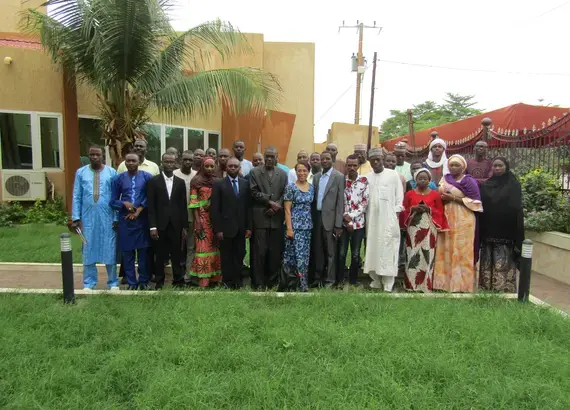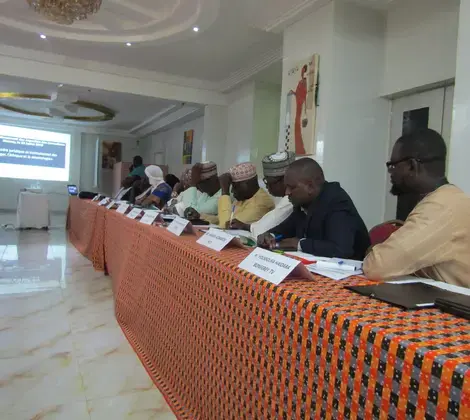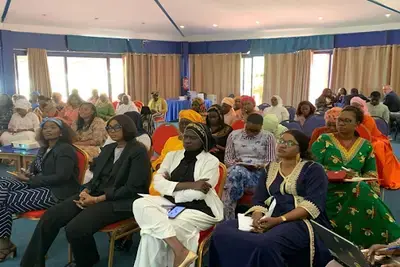
Success Story
Nigerien Journalists Revamp Skills in Preparation for the Critical 2020 Electoral Cycle
Freedom of the press is an integral element of democracy. The media plays an important role in informing citizens about current political events, including legislative actions. Lawmakers, in turn, use the media to inform and engage with their constituents. Many citizens rely upon media outlets to inform their political decisions. During elections, the media are among the primary sources of information for voters on candidates and their platforms, voter registration procedures, and critical information on election day. Niger’s media, as in many countries around the world, has critical effects on Nigerien citizens’ viewpoints of candidates and changes in electoral processes.
Due to rising trends in citizens using online media platforms, such as Facebook and WhatsApp, to find information during electoral seasons, widespread misinformation campaigns have disrupted Sub-Saharan Africa’s political scenes. Fake news played an enormous part in all of the continent’s national polls so far this year, especially as many countries have weakened or nonexistent regulation regarding privacy and data protection. From utilizing personal data to alter vote outcomes to creating false profiles or pages of disinformation and slander, these are ways companies have been accused of affecting national polls. Numerous surveys in Nigeria, Kenya, and South Africa have measured the amount of disinformation found online and in social media, and who people thought was responsible for controlling it. It was found that, “African audiences have low levels of trust in the media, experience a high degree of exposure to misinformation, and contribute – often knowingly – to its spread ( Madrid-Morales, Dani et al. “Study sheds light on scourge of “fake” news in Africa.” The Conversation.(Nov. 2018).”
Although Niger’s constitution includes freedom of the press, the current government and police forces have repeatedly taken action against journalists critical of the government. Article 100 of the 2010 constitution states that, “the Law determines the fundamental principles...of the protection of the freedom of the press and of the access to public information and administrative documents”, yet Nigerien journalists feel restricted when covering government decisions and actions. In the 2019 World Press Freedom Index, Niger ranked 66 out of 180 countries. There has been a steady decline in ranking since Niger’s democratic transition in 2010-2011, when it was “cited as an example for its respect of press freedom.”

Guided by expert facilitator Saidou Arji, an independent communications and governance consultant, participants identified key journalistic qualities and discussed Niger’s code of conduct issued by the Superior Council of Communication (Conseil Supérieur de la Communication - CSC) and challenges for its implementation during the electoral cycle. The CSC was established in 2012 to regulate all print and electronic media, audiovisual communication, and press advertising. The Code of Conduct, created in preparation for Niger’s 2016 elections, highlights provisions on journalists’ responsibilities, such as promoting political debate, utilizing honest methods of obtaining information, and balancing coverage on all political actors. Participants pointed to a lack of professional oversight of journalists and a low level of awareness of the code of conduct’s principles, including the right to privacy by public officials as some of the challenges.
Participants also reviewed laws governing Niger’s media, such as media accreditation and sanctions by the CSC against media groups or individual journalists that violate the code of conduct. Participants also discussed how to use their work to mitigate political tensions. By promoting peace and remaining neutral in published pieces, journalists can encourage dialogue and fraternity among political actors, citizens, and the government.
At the end of the training, participants recommended that media outlets provide adequate working conditions for journalists and withstand political influence or manipulation. Ibrahim Moussa, a journalist at the newspaper Roue de l’histoire, stated that, “Apart from [understanding] rules and codes of ethics, [we] learned about the basic rules of journalism. This allowed us to build on the treatment of information during an electoral period.” He added that journalists who participated in this workshop now know how to frame editorial pieces, especially during electoral periods.
As journalists prepare for what will be a monumental political year for Niger, with NDI’s help, they are better equipped with the skills required to be effective communicators to the public.



